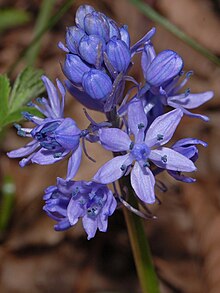Hyacinthoides italica
| Italian bluebell | |
|---|---|

| |
| Inflorescence of a wild Hyacinthoides italica | |
| Scientific classification | |
| Kingdom: | Plantae |
| Clade: | Tracheophytes |
| Clade: | Angiosperms |
| Clade: | Monocots |
| Order: | Asparagales |
| Family: | Asparagaceae |
| Subfamily: | Scilloideae |
| Genus: | Hyacinthoides |
| Species: | H. italica
|
| Binomial name | |
| Hyacinthoides italica | |
| Synonyms[1] | |
| |
Hyacinthoides italica, the Italian bluebell or Italian squill, is a spring-flowering bulbous perennial plant belonging to the family Asparagaceae.[2][3]
It is one of around 11 species in the genus Hyacinthoides, others including the common bluebell (Hyacinthoides non-scripta) in northwestern Europe, and the Spanish bluebell (Hyacinthoides hispanica) further west in the Iberian Peninsula.[4]
Description[]
Hyacinthoides italica is up to 10–40 centimetres (3.9–15.7 in) tall. The stem is leafless. It has 3-6 basal lance-shaped leaves, 4–15 millimetres (0.16–0.59 in) wide and 7–15 centimetres (2.8–5.9 in) long. The inflorescence is a dense, conical or pyramid-like raceme with 5-30 bright violet-blue star-like flowers. The flowers have two narrow bracts. Flowering period extends from February to May.[5][6][7]
It is in some respects intermediate between the common and Spanish species in having slender leaves (as in H. non-scripta or even slenderer), but a dense raceme of flowers (as in H. hispanica; not sparse and one-sided as in H. non-scripta).
H. italica is sometimes used as an ornamental plant. It has gained the Royal Horticultural Society's Award of Garden Merit.[8][9]
Distribution[]
This species is native to the central Mediterranean region, in northwestern Italy, in western Liguria, in southern France, and in northeastern Spain.[10]
Habitat[]
It can be found in olive groves, in dry and stony meadows and in clearings of forests at an elevation up to 1,700 metres (5,600 ft) above sea level.
Gallery[]

Illustration from The Botanical Magazine, Plate 663

Plants of Hyacinthoides italica in the botanic garden of Berne

Flowers of Hyacinthoides italica

Close-up of a flower
References[]
Notes[]
- ^ Catalogue of life- Accepted scientific name: Hyacinthoides italica (L.) Rothm. (accepted name) www.catalogueoflife.org, accessed 16 May 2021
- ^ Hyacinthoides italica (L.) Rothm., Feddes Repert. Spec. Nov. Regni Veg. 53: 15 (1944). International Plant Names Index www.ipni.org, accessed 16 May 2021
- ^ species: Italian Bluebell Hyacinthoides italica (L.) Rothm. Biolib, www.biolib.cz, accessed 16 May 2021
- ^ World Checklist of Selected Plant Families, The Board of Trustees of the Royal Botanic Gardens, Kew, retrieved 2011-07-05, search for "Hyacinthoides"
- ^ Hyacinthoides italica (L.) Rothm. {ID 4091} - Scilla della riviera Acta Plantarum, www.actaplantarum.org, accessed 16 May 2021
- ^ Italiensk blåstjärna Hyacinthoides italica (L.) Rothm. Den virtuella floran linnaeus.nrm.se, accessed 16 May 2021
- ^ PIGNATTI S., 1982. Flora d'Italia, Edagricole, Bologna
- ^ "Hyacinthoides italica". Royal Horticultural Society. Retrieved 25 August 2020.
- ^ "AGM Plants - Ornamental" (PDF). Royal Horticultural Society. July 2017. p. 50. Retrieved 3 March 2018.
- ^ Hyacinthoides italica (L.) Rothm. luirig.altervista.org, accessed 16 May 2021
General references[]
- Huxley, A. (1992). New RHS Dictionary of Gardening vol. 2: 604. Macmillan.
- Hyacinthoides
- Plants described in 1753
- Taxa named by Carl Linnaeus



